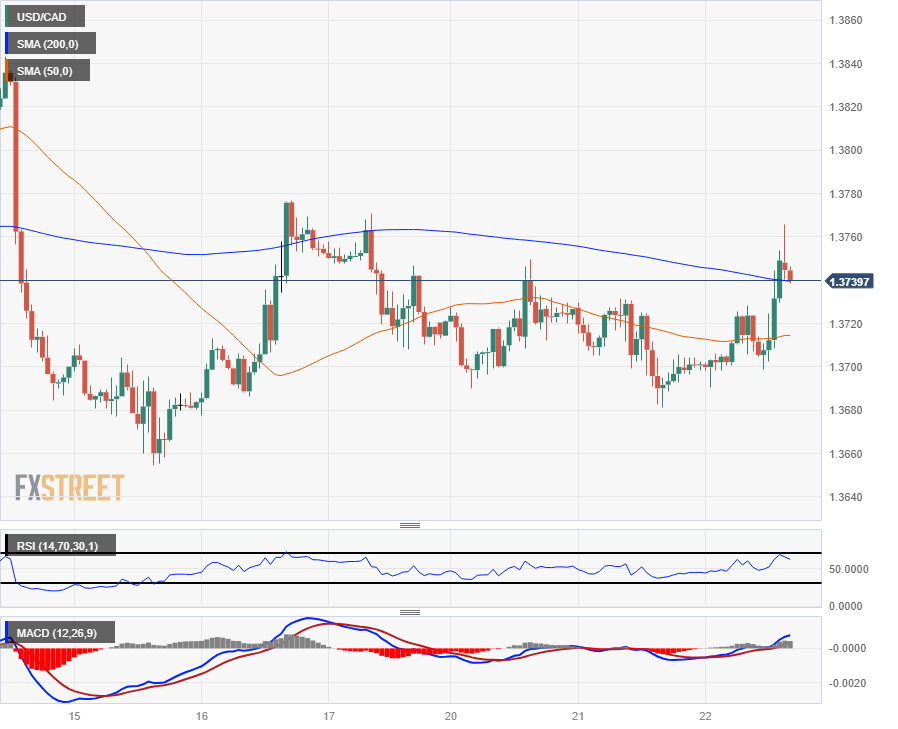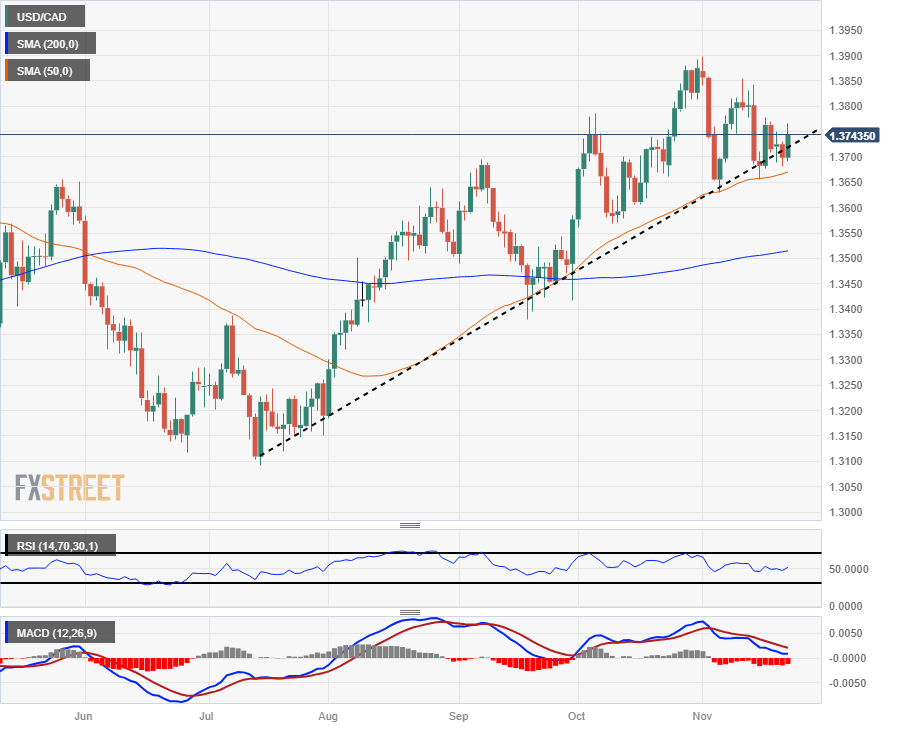- Phân tích
- Tin tức và các công cụ
- Tin tức thị trường
- Canadian Dollar falls to new weekly low, driven back by market sentiment and backsliding Crude Oil
Canadian Dollar falls to new weekly low, driven back by market sentiment and backsliding Crude Oil
- The Canadian Dollar is falling back on Wednesday as market sentiment sours on multiple fronts.
- US data is depleting risk appetite, coupled with deflating Crude Oil bids.
- USD/CAD hits a new high for the week as the US Dollar bids higher.
The Canadian Dollar (CAD) is seeing declines across the board on Wednesday, getting dragged down as Crude Oil sells off and broader markets step back into the US Dollar (USD) following a slew of US economic data that points to interest rates remaining higher for longer than markets anticipated at the start of the week.
Loonie traders will be looking ahead to Friday’s Retail Sales figures from Canada, but the figures are likely to be overshadowed by US Purchasing Managers’ Index (PMI) figures due shortly after.
US markets are also expected to see some volume on Wednesday as investors gather up their order books in anticipation of Thursday’s Thanksgiving holiday.
Daily Digest Market Movers: Canadian Dollar driven lower as Crude Oil declines and US Dollar flows reverse
- CAD sees fresh lows for the week, falling back on declining market sentiment.
- Crude Oil markets are firmly lower for the week, WTI falls below $75/barrel.
- The Organization of Petroleum Exporting Countries delayed a critical meeting on production cuts until next Thursday.
- Saudi Arabia is reportedly dissatisfied with member states’ unwillingness to stick to reduced production quotas.
- The meeting is for OPEC member state finance ministry staff and specifically focuses on production cut plans.
- Record non-OPEC production and ongoing demand concerns from China are increasing expectations of additional OPEC production cuts.
- US Initial Jobless Claims declined to a five-week low of 209K against the 225K forecast, highlighting still tight labor conditions in the US.
- The University of Michigan Consumer Inflation Expectations for November showed US consumers broadly expect long-term inflation to remain above the Federal Reserve’s (Fed) 2% target as consumers see 3.2% inflation.
- Inflation expectations tend to drive realized inflation, and elevated expectations mean the Fed was right to maintain a hawkish approach.
- Investors hoping for an accelerated path for rate cuts will be left out in the cold by elevated price growth expectations.
Canadian Dollar price this week
The table below shows the percentage change of Canadian Dollar (CAD) against listed major currencies this week. Canadian Dollar was the strongest against the Euro.
| USD | EUR | GBP | CAD | AUD | JPY | NZD | CHF | |
| USD | 0.33% | -0.07% | 0.11% | -0.34% | -0.21% | -0.29% | -0.10% | |
| EUR | -0.33% | -0.42% | -0.21% | -0.68% | -0.53% | -0.60% | -0.41% | |
| GBP | 0.08% | 0.41% | 0.20% | -0.25% | -0.11% | -0.19% | -0.01% | |
| CAD | -0.11% | 0.21% | -0.19% | -0.45% | -0.31% | -0.40% | -0.21% | |
| AUD | 0.33% | 0.66% | 0.27% | 0.45% | 0.13% | 0.05% | 0.27% | |
| JPY | 0.20% | 0.54% | -0.11% | 0.31% | -0.18% | -0.06% | 0.13% | |
| NZD | 0.28% | 0.61% | 0.21% | 0.40% | -0.05% | 0.08% | 0.18% | |
| CHF | 0.08% | 0.41% | 0.00% | 0.20% | -0.28% | -0.13% | -0.20% |
The heat map shows percentage changes of major currencies against each other. The base currency is picked from the left column, while the quote currency is picked from the top row. For example, if you pick the Euro from the left column and move along the horizontal line to the Japanese Yen, the percentage change displayed in the box will represent EUR (base)/JPY (quote).
Technical Analysis: Canadian Dollar tests new low for the week, Loonie traders looking for a mid-day recovery
The Canadian Dollar (CAD) saw fresh declines against the US Dollar (USD) on Wednesday, driving to a new low for the week and sending the USD/CAD into 1.3765.
The Loonie is now experiencing a mild recovery, dragging the USD/CAD back down below 1.3750, but further intraday downside for the Dollar-Loonie pair will require overcoming resistance-turned-support from the 200-hour Simple Moving Average (SMA) at 1.3740.
The USD/CAD continues to trade toward the high side of the rising trendline from 1.3100, and the 50-day SMA is providing technical support for any bearish moves into 1.3640.
USD/CAD Hourly Chart
 USD/CAD Daily Chart
USD/CAD Daily Chart

Canadian Dollar FAQs
What key factors drive the Canadian Dollar?
The key factors driving the Canadian Dollar (CAD) are the level of interest rates set by the Bank of Canada (BoC), the price of Oil, Canada’s largest export, the health of its economy, inflation and the Trade Balance, which is the difference between the value of Canada’s exports versus its imports. Other factors include market sentiment – whether investors are taking on more risky assets (risk-on) or seeking safe-havens (risk-off) – with risk-on being CAD-positive. As its largest trading partner, the health of the US economy is also a key factor influencing the Canadian Dollar.
How do the decisions of the Bank of Canada impact the Canadian Dollar?
The Bank of Canada (BoC) has a significant influence on the Canadian Dollar by setting the level of interest rates that banks can lend to one another. This influences the level of interest rates for everyone. The main goal of the BoC is to maintain inflation at 1-3% by adjusting interest rates up or down. Relatively higher interest rates tend to be positive for the CAD. The Bank of Canada can also use quantitative easing and tightening to influence credit conditions, with the former CAD-negative and the latter CAD-positive.
How does the price of Oil impact the Canadian Dollar?
The price of Oil is a key factor impacting the value of the Canadian Dollar. Petroleum is Canada’s biggest export, so Oil price tends to have an immediate impact on the CAD value. Generally, if Oil price rises CAD also goes up, as aggregate demand for the currency increases. The opposite is the case if the price of Oil falls. Higher Oil prices also tend to result in a greater likelihood of a positive Trade Balance, which is also supportive of the CAD.
How does inflation data impact the value of the Canadian Dollar?
While inflation had always traditionally been thought of as a negative factor for a currency since it lowers the value of money, the opposite has actually been the case in modern times with the relaxation of cross-border capital controls. Higher inflation tends to lead central banks to put up interest rates which attracts more capital inflows from global investors seeking a lucrative place to keep their money. This increases demand for the local currency, which in Canada’s case is the Canadian Dollar.
How does economic data influence the value of the Canadian Dollar?
Macroeconomic data releases gauge the health of the economy and can have an impact on the Canadian Dollar. Indicators such as GDP, Manufacturing and Services PMIs, employment, and consumer sentiment surveys can all influence the direction of the CAD. A strong economy is good for the Canadian Dollar. Not only does it attract more foreign investment but it may encourage the Bank of Canada to put up interest rates, leading to a stronger currency. If economic data is weak, however, the CAD is likely to fall.
© 2000-2026. Bản quyền Teletrade.
Trang web này được quản lý bởi Teletrade D.J. LLC 2351 LLC 2022 (Euro House, Richmond Hill Road, Kingstown, VC0100, St. Vincent and the Grenadines).
Thông tin trên trang web không phải là cơ sở để đưa ra quyết định đầu tư và chỉ được cung cấp cho mục đích làm quen.
Giao dịch trên thị trường tài chính (đặc biệt là giao dịch sử dụng các công cụ biên) mở ra những cơ hội lớn và tạo điều kiện cho các nhà đầu tư sẵn sàng mạo hiểm để thu lợi nhuận, tuy nhiên nó mang trong mình nguy cơ rủi ro khá cao. Chính vì vậy trước khi tiến hành giao dịch cần phải xem xét mọi mặt vấn đề chấp nhận tiến hành giao dịch cụ thể xét theo quan điểm của nguồn lực tài chính sẵn có và mức độ am hiểu thị trường tài chính.
Sử dụng thông tin: sử dụng toàn bộ hay riêng biệt các dữ liệu trên trang web của công ty TeleTrade như một nguồn cung cấp thông tin nhất định. Việc sử dụng tư liệu từ trang web cần kèm theo liên kết đến trang teletrade.vn. Việc tự động thu thập số liệu cũng như thông tin từ trang web TeleTrade đều không được phép.
Xin vui lòng liên hệ với pr@teletrade.global nếu có câu hỏi.















